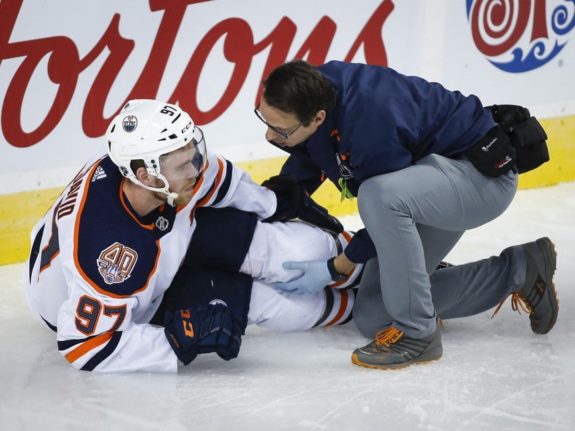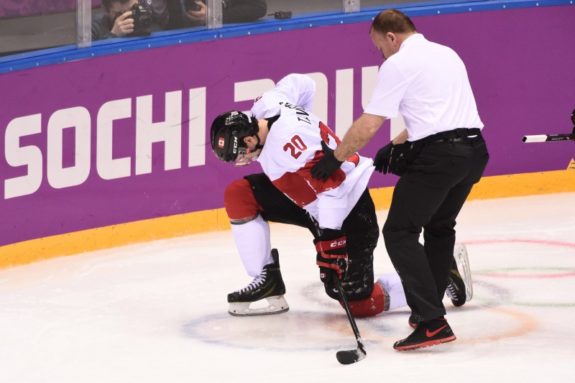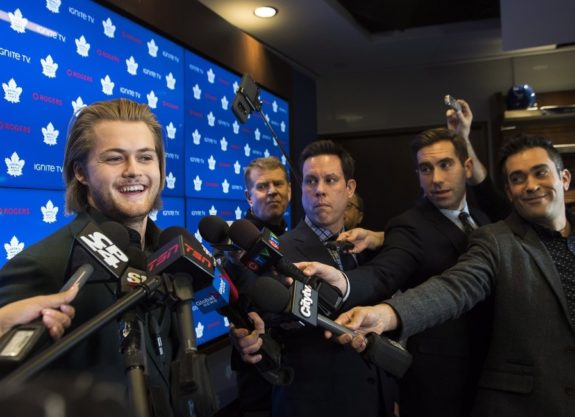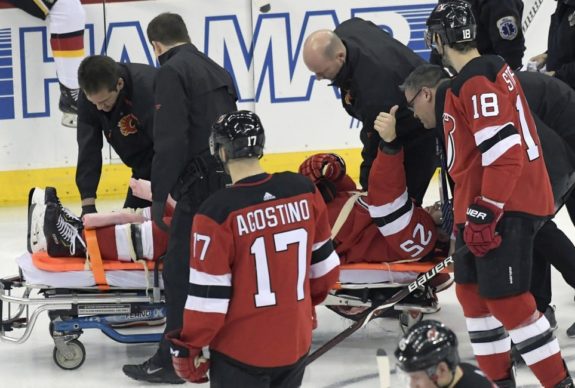
 Christopher Kelsall
The Hockey Writers
Christopher Kelsall
The Hockey Writers
34
Reads
0
Comments
NHL and NHLPA Should Be More Open About Player Health
Professional sports and especially the National Hockey League (NHL) have long done what they can to not disclose player health to the media. Individual team staff and players have also kept tight-lipped to protect potentially injured players. For example, when disclosing a specific injury, it is feared that the information will expose that player to abuse by opponents who will target that area of the body — we get it.
Related: Are NHL Players the Toughest Athletes?
However, it appears, that the COVID-19 pandemic has given the league, NHLPA, and teams permission to tighten up even more. It is alleged that the NHL and NHLPA have imposed a total blackout on any news related to the health of players.

According to the opinion of Pat Hickey with the Montreal Gazette (from ‘Hickey on Hockey: Crosby’s early exit puts spotlight on stupid NHL policy,’ Montreal Gazette, 07/20/2020), “the coronavirus has provided the NHL with an excuse to formalize an unofficial policy of hiding medical information.”
The lack of communication could result in players, who may have simply tweaked a muscle or provoked a minor injury, to be rumoured to be infected with COVID-19. A positive test carries a stigma with it. This is not a professional process for communicating with the fanbase by way of official media.
Pandemic Timeline
The league paused on March 12 and had declared the season concluded as per all games played through to March 11. They cancelled the remaining 189 regular-season games to April 4, 2020, which would have been the conclusion of the regular season schedule.
On May 26, the league announced a return to play plan where camps would begin July 13 and then players who choose to play (they are permitted to opt-out) would arrive at the two hub cities of Toronto and Edmonton on July 26.

There is an 80-page reintegration document that the league published. The league had its work cut out for them dealing with cancelling the remainder of the regular season while at the same time negotiating a new, four-year collective bargaining agreement. Perhaps the apparently unwritten blackout rule was hastily thought out.
The Return to Ice
Granted, the players will be a little rusty, leaving official media to speculate on player condition, which will cause the NHL communications department to get busy putting out a steady stream of fires — more work than it is probably worth.
The players typically have a break of about 110 days between the Stanley Cup Final and the start of training camp for the next season. It will be 140 days since the league last played on March 11 once the 24-team Stanley Cup round-robin tournament begins. There will be some pulled groins, minor concussions and cases of COVID-19. It would be wise to know who is under quarantine at any given time.
Related: Deja Flu – Pandemic Wiped Out the 1919 Seattle-Montreal Stanley Cup Final
In 2011, the NHL first published their social media policy (since updated), which in part reads, “As per the new policy, there is a total “blackout period” on the use of social media on game days, which for players begins two hours prior to opening face-off and is not lifted until players have finished their post-game media obligations. The suggested blackout period for hockey operations staff is longer, beginning at 11 A.M. on game days.”
Social media is exactly as described: people being very social. There is little regulation and social media comments and shares by non-official media are rarely the source of truth. Whereas official media has the mandate to follow journalistic best practices. Not every publication gets it right every single time, but the profession requires skill as well as the guidelines to uphold a high standard of journalistic integrity.
Most official publications provide well-informed and thought-provoking editorial content to educate the audience about the information they seek on a specific subject matter. Treating official media with a similar blackout policy as they do with social media (on player health) will potentially flame the fires of misinformation.

The NHL and the NHLPA should re-think the policy and consider that in all communications to advise media what is publishable and what is not publishable on a case-by-case basis, leaving speculation to the cellphone paparazzi.
Playoff Format
Competitive Format
* In each Conference, teams seeded by points percentage.
Round Robin: The top 4 teams play for First Round seeding (regular-season overtime rules in effect)
Qualifying Round: The remaining 8 teams play best-of-5 series to advance to the First Round (playoff overtime rules in effect)
First Round and Second Round: Format (seeding vs. bracket) and series lengths to be determined
Conference Finals and Stanley Cup Final: Best-of-7 series
* The winners from the Qualifying Round play the top 4 seeds in the First Round. Individual First Round series matchups remain to be determined.
Injuries Will Occur
Considering the intense playoff schedule after having a long 140 days off, Stanley Cup-level play will likely introduce a higher rate of injury than normal. Hockey in August and September is unusual. If the NHL and the NHLPA want their fanbase connected, a big part of that connection is going to have to be through official media.

Media is one of the four pillars of democracy. Professional sport is a small manifestation of a democratic society. Yes, there are many more important things going on in the world, but don’t tell that to your raving fan who is willing to dedicate warm summer nights to watching hockey, connecting with highlights and stories and investing hundreds of hard-earned dollars to watch live games in-person.
The post NHL and NHLPA Should Be More Open About Player Health appeared first on The Hockey Writers.
Popular Articles

















































 Canucks Vancouver
Canucks Vancouver Sharks San Jose
Sharks San Jose Flames Calgary
Flames Calgary Avalanche Colorado
Avalanche Colorado Coyotes Arizona
Coyotes Arizona Golden Knights Vegas
Golden Knights Vegas Wild Minnesota
Wild Minnesota Red Wings Detroit
Red Wings Detroit Blues St. Louis
Blues St. Louis Blackhawks Chicago
Blackhawks Chicago Blue Jackets Columbus
Blue Jackets Columbus Hurricanes Carolina
Hurricanes Carolina Jets Winnipeg
Jets Winnipeg Predators Nashville
Predators Nashville Ducks Anaheim
Ducks Anaheim Oilers Edmonton
Oilers Edmonton Sabres Buffalo
Sabres Buffalo Rangers New York
Rangers New York Bruins Boston
Bruins Boston Panthers Florida
Panthers Florida Senators Ottawa
Senators Ottawa Lightning Tampa Bay
Lightning Tampa Bay Capitals Washington
Capitals Washington Islanders New York
Islanders New York Devils New Jersey
Devils New Jersey Maple Leafs Toronto
Maple Leafs Toronto Flyers Philadelphia
Flyers Philadelphia Penguins Pittsburgh
Penguins Pittsburgh Stars Dallas
Stars Dallas Kraken Seattle
Kraken Seattle Kings Los Angeles
Kings Los Angeles


